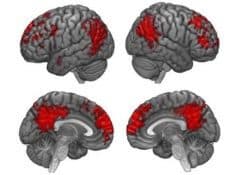University of Southern California brain research shows that reading stories creates activity in the same areas of the brain in speakers of three different languages
New brain research conducted at the University of Southern California (USC) shows that reading stories is a universal experience that may make people feel more empathetic toward other people, regardless of cultural differences and origins.

Researchers at USC have found patterns of brain activity when people find meaning in stories, regardless of language. Apparently this study is the first to find such findings in the field of neurological research. The scientists used functional MRI to map responses to stories in three different languages—English, Farsi, and Mandarin Chinese.
The research at USC opens up the possibility that exposure to stories has a widespread effect on the development of self-awareness and empathy for others, regardless of the language or origin of the person exposed to the story.
"Even fundamental differences in language, such as a language that reads from right to left, versus a language that reads from left to right, or a language that uses a completely different alphabet, there is something universal in what happens in the brain at the moment when we process the stories," said Morteza Dehgahni, lead author of research and researcher at the Brain and Creativity Institute at USC.
Deghani is also an adjunct professor of psychology at the USC Dornsife College of Letters, Arts and Sciences and an adjunct professor of computer science at the USC Viterbi School of Engineering.
The study was published on September 20 in the journal Human Brain Mapping.
Try to understand 20 million personal anecdotes
The researchers searched more than 20 million personal story blog entries using software developed at USC's Institute for Creative Technologies. The entries were narrowed down to 40 stories about personal issues such as divorce or lies.
The records were translated into Mandarin Chinese and Persian, and read by 90 American, Chinese and Iranian subjects in their native language while their brains were scanned by MRI. Subjects also answered general questions asked about the stories as they were scanned.
The researchers used machine learning techniques and advanced text analysis techniques and in the analysis of more than 44 billion classifications and were able to "reverse engineer" the data from the brain scans and find which story the reader processed in each of the three languages. In fact the researchers were able to read the minds of the participants as they read.
The mind does not rest
In each of the languages, as a result of reading the story, unique patterns of activity were created in the "network of the default mode of operation" of the brain. This network is a network that activates areas of the brain that are interconnected, such as, for example, the middle frontal lobe, the posterior cingulate, the hippocampus.
Originally it was explained that the default mode network is a kind of autopilot of the brain when it is at rest and that it is only active when you are not deliberately thinking about something. Other studies, including the current study, indicate that the network works behind the scenes when the brain is seemingly at rest, and it constantly tries to find meaning in the story and serves as a retrieval system for autobiographical memories that affects our perception of the past, the future, and our relationships with other people.
"One of the greatest mysteries of neurological research is how we make meaning out of our world. Stories are something deeply rooted in human nature, and they help create meaning." says Jonas Kaplan, one of the authors at the Brain and Creativity Institute and associate professor of psychology at USC Dornsife.
to the notice of the researchers

5 תגובות
I don't necessarily see a connection between the amount of time spent on something and the depth one reaches in it. Especially if the goal of that sect was to control people, and not necessarily to deepen Kabbalah.
Dory
A close friend of mine managed to escape the scourge of acceptance now, after 20 years of brainwashing. These evil people ruined his life, and even forced him to change his first name. 20 years is not a superficial study...
It will be interesting to see how Kabbalah writings will affect those who are not involved in Kabbalah and those who are involved in the wisdom of Kabbalah.
And among those who study Kabbalah.
On those who study the superficial things, use red threads and holy water.
Compared to those who learn the wisdom of Kabbalah from the sources.
It will be interesting to follow how the research results will be used to adapt them to ideologies
It will be interesting to see how recorded stories (Audiobooks) affect the brain.
This would separate the element of reading, but leave the part of absorbing a new story.